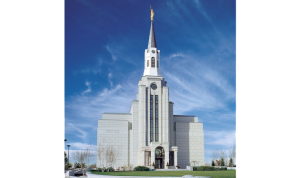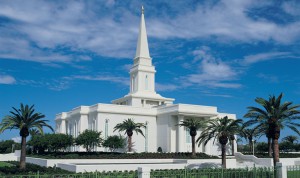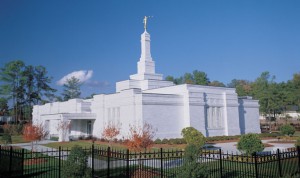Myth: When the Church announces the construction of a new temple, local opposition sometimes claims that the presence of a temple in the neighborhood “lowers property values,” or even renders homes “unmarketable.”[1]
Reality: To read what non-Mormon government officials and neighbors have said about this issue, please see here.
To study this claim, an economic analysis was undertaken in 2003, in which the value of 207 properties were evaluated. The properties had the following characteristics:

- all were within 2 miles of a temple; half were within one mile;
- all were within the same community as the temple, since property values can vary widely in a metropolitan area between communities;
- prices used were prices paid for the sale of the homes–it did not use prices “asked” by the seller.
The properties were from three different communities in which LDS temples were built:
- Boston, Massachusetts (map location)
- Orlando, Florida (map location)
- Raleigh, North Carolina (map location)
For the purposes of this study, a decline in value of 25% was regarded as “substantial” loss of value (based upon Peter Lynch of Fidelity Investment’s characterization).[2] Commercial properties were excluded from the analysis.

Results of the study
- Of the properties studied, 95% showed an increase in value of $29,455 – $77,445 (USD). (If the claim that the temple substantially decreased property values was true, one would expect 95% of the properties to show a decline of at least $51,000).
- Orlando showed a 99.9% probability that the presence of the temple increased property values.
- Boston had too few observations to convincingly prove or disprove the claim that property values were affected (Boston does not publish the value of properties sold on-line).
- Raleigh showed no increase or decrease in property values. (The author hypothesized that smaller temples may cause less increase in property values, or that the Raleigh temple was simply too recent to have yet shown an effect.)
- Temple size seems to add to property values–for each square foot of temple floor space, local residential properties increase in value by 43 cents (standard deviation of 21.5 cents). There is a 95% probability that larger temples add more value than smaller temples.
Conclusion
This analysis demonstrated that the presence of a Mormon temple in a residential area in the United States is likely to increase property values. There is no evidence that property values are lowered by the presence of a temple; at worst, the effect on residential value is neutral. The study also strongly suggests that the size of the temple is directly correlated to an increase in property values.[3]
References
[1] Kent Larsen, “Town Meeting Highlights Neighbor Feelings Over Harrison Temple,” Mormon-News (6 August 2001).
[2] Peter Lynch, interview on Frontline, PBS.
[3] To read the entire study and to see the raw data, please see Steven J. Danderson, “The Impact of LDS Temples on Local Property Values,” (Mesa, Arizona: FAIR, February 2003).

